“I don’t live in the past but the past lives in me.” — Sol Fineblum
For Gershon Markowitz, this time of year presents an irresistible opportunity to engage in some of his favorite activities with some of his favorite people. “That’s when I get to teach the grandchildren the art of building a sukkah,” says this grandfather of 15 who lives in Jerusalem.
And, on the other side of the world, a close look at the congregation at Temple of Aaron Synagogue in St. Paul last March during Stevie Paper’s bat mitzvah would have revealed the equally proud smiles adorning the faces of two attendees, easily identifiable as her grandparents.

Increasing evidence has shown that interaction between the generations has a unique and powerful role to play in the future of Jewish life.
Whether your grandchildren call you Grandma/Grandpa, Mom-Mom/Pop-Pop, Bubbe/Zayde, Savta/Saba, Nana/Papa or some other appellation, this is not the time to sit back and relax. You have a job to do.
As New Year’s resolutions kick in for the year 5785, grandparents can vow to do an even better job of transmitting a love of Judaism to their grandchildren.
Stevie’s maternal grandfather, Josh Engman, models what a committed Jewish life looks like through his involvements: running the Jewish cemetery in Des Moines and helping with the Jewish senior life center and the Jewish Historical Society there, plus preparing a Torah reading for Stevie’s bat mitzvah.
“With cell phones and other seductive distractions, I believe it’s more important for grandparents to show the kids who we are,” says Engman, 68, who grew up surrounded by grandparents and other extendeds—their Shabbat and holiday meals redolent with matzah-ball soup and kreplach indelibly engraved on his memory. “My grandparents rubbed a Jewish life off on me, and I’m hoping to rub it off on my grandkids.”
Unlike Engman, Stevie’s other living grandparent—her paternal grandmother Raline Paper—never knew her grandparents. “So, I feel blessed to be in my grandchildren’s lives,” says Paper, a snowbird who flies between her home in St. Paul and her native state of Florida.
“High Holidays, we always sat in the same seats in shul, and I wrapped the tzitzit of my father’s tallis around my finger,” says Paper. A familial tallis now belongs to her grandson. “It’s a blessing seeing our family’s Jewish life continuing down the generations.”
‘Need to step up’
According to David Raphael, Jewish grandparents bridging the intergenerational divide is increasingly crucial to the Jewish future.
So, seven years ago, Raphael examined the key role that they play. To help support them, he founded the Jewish Grandparents Network, along with Lee M. Hendler.

“With life expectancy and healthy functioning on the rise, a generation of active grandparents are often supporting overtaxed parents with carpooling, childcare and more,” says Raphael.
Their involvement as transmitters of Jewish tradition has never been so important, he states plainly.
Raphael talks about the changing nature of the Jewish family, socially and geographically: “Grandparents living far from their grandkids, a dwindling engagement in Jewish life and more than half of Jewish grandparents having at least one grandchild being raised in a multifaith family require both involvement and sensitivity.”
These trends are among those reflected in the Network’s 2019 National Study of Jewish Grandparents. One of the things learned from the 6,785 Jewish grandparents they surveyed is that it’s not just about what they say but how they live Jewishly. “If we want our grandchildren to be on a Jewish journey, they have to see that we’re on our own—Shabbat meals, lighting candles, synagogue involvement and Jewish artifacts around the house,” he says. (See the Network’s Family Room for tips and resources, including such creative uses of technology as long-distance cooking.)
“Today, every Jewish grandparent needs to step up,” says Rabbi Manis Friedman, who’s a great-grandfather. “Even if they’re not observant, the kids need to see their grandparent is a proud Jew so they’ll know that it’s important that they’re a proud Jew, too.”

This is never more important than in an environment of antisemitism, he maintains. “Connecting children to their grandparents gives them a stronger Jewish identity so they’re not as vulnerable. They know that their people go way back in history, instead of thinking that who they are only started with themselves,” he says. “And their grandparent is an important link in that ancient people who they are so much a part of.”
Often, youngsters appreciate Jewish traditions coming from their grandparents, “who adore them unconditionally,” rather than their parents, adds the rabbi, a longtime Chabad-Lubavitch emissary in Minnesota, online teacher and author of Creating a Life That Matters: How to Live and Love with Meaning and Purpose, among other titles.
And that can mean learning Torah together. “In this world of constant change, we’re all looking for those things that were true when we were kids and are still true for our grandchildren,” says Friedman. “The more things change in the world, the more we need our Torah giving us this kind of eternal truth.”
To make multigenerational learning easily accessible, in 2020 the first Herzog College Parsha Sheet landed in a few grandparents’ inboxes. Filled with insights, questions and discussion topics around the weekly Torah reading from educators at Herzog College, a Jewish teachers’ training program in Israel, more than 500 such sheets now reach grandparents each week, along with rabbis, parents and educators.
“The M’Dor L’Dor (‘From Generation to Generation’) Torah-portion sheet suggests ideas for intergenerational sharing of experiences and feelings,” says Sarah Manning who organized the free service during the years of the COVID pandemic, when many families experienced forced separation, particularly with seniors.
‘More leverage, more influence, more impact’
Markowitz of Jerusalem enjoys talking Torah with those grandchildren old enough to engage in it. And, fortunately for all concerned, the 15 of them—ages 9 months to 16 years—live in the Jewish state.
He comes from a grandparent-soaked childhood—his maternal grandfather (aka Zayde) lived downstairs in their apartment house in Brooklyn, N.Y., and was his bar mitzvah tutor back in the 1960s.

As family historian, Markowitz is beginning to share what he’s learned about his and his late wife’s ancestors with their grandchildren, including the losses his family sustained during the war years.
“With so many technical distractions—all we had was an Etch-A-Sketch—grandparents have the time the parents don’t have to tell stories of the old days,” he says. “The kids know as soon as I get to town it’s time to order the pizza, go to the park and just talk.”
Grandson Binyamin Tub, who became a bar mitzvah last month (Sept. 28, to be exact) says he finds both this saba (Hebrew for “grandfather”), who on Rosh Hashanah blows shofar in homes of neighbors too sick to attend services, and his great-grandfather, who at 92 still drives to his New Jersey synagogue for daily prayers, “pretty inspiring.”

“They’re showing me you can still do lots of good things even when you’re old. I want to be humble like them and also give a lot of tzedakah (‘charity’),” says the 13-year-old.
“Coming as they do with an unlimited well of love and stories, never underestimate the power of a grandparent to influence their grandchild,” says Lori Palatnik, grandmother of six and founding director of Momentum, an organization devoted to bringing Jewish women close to their heritage. “I tell grandparents that you can’t outsource Judaism to your kids to pass on. You have more leverage, more influence, more impact on the grandchildren than you think.”
Indeed, she adds, many have told her that a grandparent was the reason they made major life decisions like marrying Jewish or returning to their Jewish roots.
Having grown up in Toronto with immigrant grandparents from Eastern Europe, Palatnik says, taught her “that children need to hear what their grandparents have to teach them. If nobody hears them, when you bury them you are also burying their traditions and their stories.”
‘I just love being with them’
Not all those filling the grandparent role are biological relatives. Susan Phillips was in her late 30s when she began to suspect she was probably not going to have children (though she did become a stepmother later on). “So, I knew if I were going to have kids in my life, I would need to reach out,” she says.

Over the last four decades, Phillips, now 77, has befriended more than a dozen children at her temple, Congregation Beth El in Sudbury, Mass. The relationships typically take the child from toddlerhood through high school and sometimes beyond, including the occasional kid going through some bumpy teen years where a nonjudgmental, loving grandma figure has proven a godsend.
“I’m often the ‘grandparent’ who shows up at plays, recitals and concerts to cheer them on,” says Phillips, who taught in the temple’s religious school for many years. “But it’s really having an extra Jewish grandparent in their lives where it counts most—and I’m there for all their bar/bat mitzvahs,” she adds.
The payoff? “Mostly I just love being with them, but there was the day one dad came up to me at temple to say his kids are Jewish because of me—that they’re still doing Jewish stuff in college. I was overwhelmed by that.”
Indeed, the benefits of intergenerational love flow both ways, Palatnik insists. “As the old joke goes, ‘Grandchildren are God’s reward for not killing your teenager.’”

























